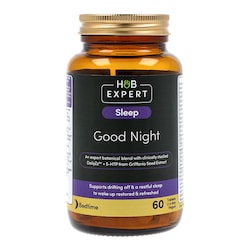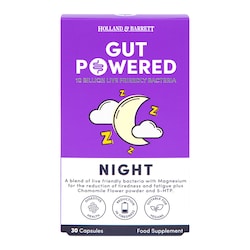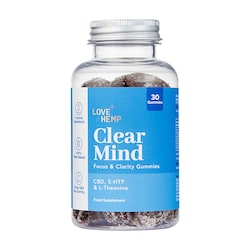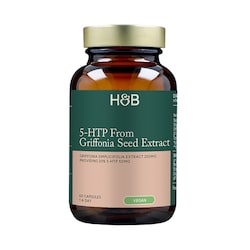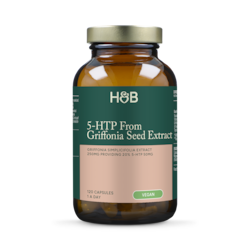15% off £20
Code:SPEND
5-HTP: uses, side effects and more

Could 5-HTP be your ticket to support a balanced mood and more restful sleep? We explore the latest research on this precursor to the ‘happy hormone’, serotonin
Summary
1What is 5-HTP?
5-HTP is a type of amino acid that your body makes from another amino acid called tryptophan…
2Exploring the benefits of 5-HTP
There’s no recommended daily amount for 5-HTP, but studies on its impact on the human body have involved amounts, ranging from 50mg a day to 300mg...
3Side effects of 5-HTP
Because serotonin is also involved in gut activity, taking 5-HTP can lead to digestive issues, such as heartburn, nausea or diarrhea...
Have you heard about 5-hydroxytryptophan (5-HTP) and want to find out why people are talking about it? You’ve come to the right place.
Let’s take a closer look at 5-HTP, including what it is, what it does in the body and what the research says so far.
What is 5-HTP?
5-HTP is a type of amino acid that your body makes from another amino acid called tryptophan, which in turn can form neurotransmitters (chemicals that help send messages in your brain).1-3
It’s also important for making serotonin, another neurotransmitter that affects your mood, memory, learning, sleep and more.2,3
Because serotonin plays a crucial role in regulating mood, sleep, appetite, and other bodily functions, low levels can lead to a range of problems including difficulty sleeping and weight gain, As a result, scientists have been investigating 5-HTP since the 1970s to determine if it can offer support in these areas, though further studies are needed.4
Interestingly, 5-HTP also comes from certain plants, especially the seeds of an African shrub called Griffonia simplicifolia.2,4 5-HTP supplements tend to be made from the seeds of this plant.3
What does the research say about supplementing 5-HTP?
As a regulatory hormone, serotonin – which is produced with the help of 5-HTP – plays a key role in various functions in the body and the central nervous system.3 As a result, ongoing research is exploring the roles 5-HTP may play in the body.
Overall, there’s limited scientific evidence for the benefits of supplementing 5-HTP. However, some small studies have found some promising results which warrant further discussion. Here are some of the findings of that research.
A recent randomised controlled trial found that 5-HTP may offer significant benefits for certain individuals, particularly those who are overweight or obese.5
In just four weeks, participants taking 5-HTP saw notable improvements in BMI, as well as reductions in arm and hip circumference, compared to those taking a placebo.5 This promising effect may be linked to a significant increase in feelings of fullness, suggesting 5-HTP could play a role in managing appetite.5
While these findings are encouraging, further research is necessary to confirm these results and explore the long-term effects.
Some early studies suggest that 5-HTP could help with sleep.
One small study with 20 adults showed that 5-HTP might shorten the time it takes to fall asleep (this is called "sleep latency").6 However, this research was conducted in a very small sample.6 On top of this, these effects were found to be short-lived.6 As a result, further research in larger populations is needed to confirm whether there is a real effect of 5-HTP on sleep.6
A study conducted in Singapore explored whether 5-HTP supplementation could improve sleep quality in older adults, considering the well-established importance of sleep for overall health and the growing evidence linking gut health to sleep.7 Thirty adults participated in the 12-week trial, with one group receiving a daily 5-HTP supplement and a control group receiving no supplement. Participants’ sleep was carefully monitored using both sleep trackers and questionnaires, and researchers also assessed blood serotonin levels and gut health.7
The results indicated that – compared to the placebo group – 5-HTP appeared to improve subjective global sleep scores, gut microbiota diversity, and the relative abundance of SCFA-producing bacteria, particularly among participants who had reported pre-existing sleep difficulties.7 However, 5-HTP had minimal impact on participants who reported already being ‘good’ sleepers.7
5-HTP is used by the brain to make serotonin, a chemical messenger that plays a key role in regulating mood. 5-HTP easily passes from the bloodstream into the brain (crossing what's called the blood-brain barrier), where it’s converted into serotonin.
This has led scientists to believe that 5-HTP supplementation might help balance serotonin levels, which could then positively influence mood.
However, in 2009, the European Food Safety Authority (EFSA) reviewed the available research and concluded that there wasn't enough strong evidence to directly link taking 5-HTP in food or supplements to improved mood.
Despite this conclusion, scientists continue to study 5-HTP and its potential effects on mood. Many of the studies done so far haven't been as well-designed as they could be, and the results have been mixed. This means more thorough research is needed.
Overall, there’s limited scientific evidence for any benefits of 5-HTP. However, some emerging studies have found some exciting promising results which warrant further study. Stay tuned!
What is the recommended 5-HTP dosage?

There’s currently no recommended daily dosage of 5-HTP. As a result, you should always stick to the product label dosage and speak to a healthcare professional, such as your GP, before beginning to take a 5-HTP supplement.
If you’re not able to take 5-HTP as a supplement, you may be able to increase the levels in your body by consuming foods which contain tryptophan.8 This is because 5-HTP is produced by tryptophan, which is found in foods such as seeds, soya, milk and vegetables.8
Studies exploring the effects of 5-HTP on various wellness benefits have used amounts ranging from 50mg to 100mg.2 Crucially, doses above 100mg have been associated with vomiting and nausea.2 Each product will have different amounts of 5-HTP, so always read the product label and make sure you follow the dosage instructions.
Side effects of 5-HTP
It’s important to make sure you don’t take too much 5-HTP due to the risk of serotonin syndrome, which is when the serotonin levels in the brain become too high because of medication.2
The symptoms of serotonin syndrome include agitation, anxiety, confusion, hyperthermia, hypertension, vomiting, diarrhoea, muscle rigidity and tremors.2,9 Importantly, serotonin syndrome can be fatal.2,9
As a result, 5-HTP shouldn’t be taken alongside other medications that lead to an increase in serotonin, such as antidepressants and migraine medications.2,10 Speak to your doctor before taking any new supplements including 5-HTP to make sure it is suitable for you.
The final say
Despite emerging studies indicate that 5-HTP may be beneficial for sleep and weight management.2,4,5 there’s currently no conclusive evidence regarding the effectiveness of 5-HTP for any health conditions. As a result, much more research is needed in this area.
Due to the risk of serotonin syndrome, it’s important that 5-HTP isn’t taken in excessive amounts.2,6 In particular, 5-HTP shouldn’t be taken alongside medications that also increase your levels of serotonin.2,10
To be on the safe side, if you’re considering supplementing with 5-HTP, you should speak to a healthcare professional, like your GP, before you begin taking it.
The advice in this article is for information only and should not replace medical care. Please check with your GP or healthcare professional before trying any supplements, treatments or remedies. Food supplements must not be used as a substitute for a varied and balanced diet and a healthy lifestyle.
While we strive for accuracy and balance, please be aware that this article may discuss products available for purchase through Holland & Barrett. Consult a healthcare professional before making any health-related decisions.
- Otrav İ, Günal AM. Effects of 5-hydroxytryptophan (5-HTP) nutritional supplement on health. JOINIHP. 2023;4(1):1–8. https://dergipark.org.tr/en/pub/joinihp/issue/76305/1200416
- Maffei ME. 5-Hydroxytryptophan (5-HTP): Natural occurrence, analysis, biosynthesis, biotechnology, physiology and toxicology. Int J Mol Sci. 2021;22(1):181. https://doi.org/10.3390/ijms22010181
- Jones LA, et al. The ever-changing roles of serotonin. Int J Biochem Cell Biol. 2020;125:105776. https://doi.org/10.1016/j.biocel.2020.105776 J
- Javelle F, et al. Effects of 5-hydroxytryptophan on distinct types of depression: A systematic review and meta-analysis. Nutr Rev. 2020;78(1):77–88. https://doi.org/10.1093/nutrit/nuz039
- Mariangela Rondanelli, Opizzi A, M Faliva, Bucci M, Perna S. Relationship between the absorption of 5-hydroxytryptophan from an integrated diet, by means of Griffonia simplicifolia extract, and the effect on satiety in overweight females after oral spray administration. PubMed [Internet]. 2012 Mar 1 [cited 2024 Dec 30];17(1):e22-8. Available from: https://pubmed.ncbi.nlm.nih.gov/22142813/
- Sutanto C, et al. The impact of 5-hydroxytryptophan supplementation on sleep quality of older adults in Singapore: A randomized controlled trial. Curr Dev Nutr. 2021;5(Supplement_2):372. https://doi.org/10.1093/cdn/nzab037_082
- Sutanto C, et al. The impact of 5-hydroxytryptophan supplementation on sleep quality and gut microbiota composition in older adults: A randomized controlled trial. Clinical Nutrition. 2024;43(3):593-602. Available from: https://www.clinicalnutritionjournal.com/article/S0261-5614(24)00010-4/abstract
- Comai S, et al. Tryptophan in health and disease. Adv Clin Chem. 2020;95:165–218. https://doi.org/10.1016/bs.acc.2019.08.005
- Scotton WJ, et al. Serotonin syndrome: Pathophysiology, clinical features, management, and potential future directions. Int J Tryptophan Res. 2019;12(12):117864691987392. https://doi.org/10.1177/1178646919873925
- Blumenfeld A, et al. Serotonin syndrome in the acute treatment landscape of migraine: The lasmiditan experience. Front Neurol. 2023;14:1291102. https://doi.org/10.3389/fneur.2023.1291102




